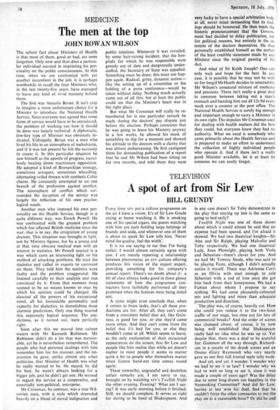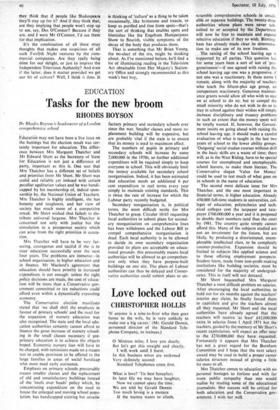TELEVISION
A spot of art from Sir Lew
BILL GRUNDY
Every time ATV put a culture programme on the air 1 have a vision. It's of Sir Lew Grade sitting at home watching it. He is smoking one of his special cigars, the guests watching with him are each holding large helpings of brandy and soda, and whenever one of them is about to speak Sir Lew tells him, 'Never mind the quality, feel the width'.
It is no use saying to me that I'm being unfair. I would almost certainly agree with you. I am merely reporting a relationship between phenomena; an ATV culture offering produces this vision of the export expert, providing something for his company's annual report. There's no doubt about it: a bit of class always looks good in those glossy statements of how the programme con, tractors have faithfully performed all they promised when the licences were being doled out.
A cynic might even conclude that, when it comes to brass tacks, that's all these pro- ductions are for. After all, they can't come from a consistent belief that art, like Guin- ness, is good for you, or else they'd come more often. And they can't come from the belief that it's bad for you, or else they wouldn't come at all. Which seems to leave, as the only explanation of their occasional appearances on the screen, that Sir Lew and people like him realise that while art doesn't matter to most people it seems to matter quite a bit to people who themselves matter when licence hand-out time comes round again.
These unworthy, ungrateful and doubtless unfair remarks are, I am sorry to say, brought on by watching arv's Twelfth Night the other evening. Evening! What am I say- ing? It was early morning before it finished. Still, we should complain. It serves us right for daring to be fond of Shakespeare. And in any case doesn't Sir Toby demonstrate in the play that staying up late is the same as going to bed early?
Twelfth Night was one of those shows about which it could almost be said that no expense had been spared, and I'm afraid it showed. We had two theatrical knights—Sir Alec and Sir Ralph, playing Malvolio and Toby respectively. We had one theatrical Lady, Joan Plowright, playing both Viola and Sebastian—there's clever for you. And we had Mr Tommy Steele, who was said to be playing Feste, although I didn't actually notice it myself. There was Adrienne Corri as an Olivia with steel enough to rule Sebastian with a rod of iron once she got him back from their honeymoon. We had a Fabian about whom I propose to say nothing. We had some pleasantly-coloured sets and lighting and more than adequate production and direction.
The play was, of course, heavily cut. How else could you reduce it to the two-hour traffic of our stage, less time out for lots of commercial breaks? And the order of scenes was changed about, of course, it by now being well established that Shakespeare really had no idea what he was up to. Yet despite that, there was a deal to be grateful for: Guinness all the way through, Richard- son in a couple of the drunk scenes and an Orsino (Gary Raymond) who very nearly gave us our first full frontal male telly nude.
And yet, and yet. I wonder. I wonder why we had to see it so late? I wonder why we had to wait so long to see it, since it was made a couple of years ago? Was the delay due to some long-drawn out haggling in the Networking Committee? And did Sir Lew, having at last won his duel, find that he couldn't force the other companies to put the play on at a reasonable hour? Or did he and they think that if people like Shakespeare they'll stay up for it? And if they think that, are they implying that people won't stop up to see, say, Des O'Connor? Because if they are, and I were Mr O'Connor, I'd sue them for that implication.
It's the combination of all these stray thoughts that makes one suspicious of all such Twelfth Night ventures by the corn• mercial companies. Are they really being done for our delight, or just to impress the Independent Television Authority? And even if the latter, does it matter provided we get our bit of culture? Well, I think it does. It
is thinking of 'culture' as a thing to be taken occasionally, like brimstone and treacle, to keep us purified and free from spots—that's the sort of thinking that enables spots and blemishes like the Engeltom Humperjones Show to flourish, visible symptoms of the decay of the body that produces them.
That is something that Mr Brian Young, the Do-elect of the 1TA, might be thinking about. As I've mentioned before, he'll find a lot of illuminating reading in the Television Act obtainable from Her Majesty's Station- ery Office and strongly recommended as this week's best buy,























































 Previous page
Previous page